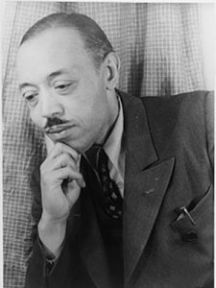William Grant Still
-
 Archaic Ritual
Archaic RitualScore and Parts (C863): Rental Large Score (C863L): $71.99 Study Score (C863F): $40.99 Full Orchestra
 William Grant Still (May 11, 1895 – December 3, 1978) was an African American classical composer who wrote nearly 200 compositions during his lifetime, exploring a variety of genres including orchestral music, vocal music with orchestra, and choral music. He was the first African American to conduct a major American symphony orchestra, have a symphony (his Symphony No. 1) performed by a leading orchestra, and have an opera performed by a major opera company and broadcast on national television. His music blends a number of uniquely American genres, including Blues, Jazz, and Spirituals together with traditionally classical elements. He is often referred to as "the Dean of African American composers".
William Grant Still (May 11, 1895 – December 3, 1978) was an African American classical composer who wrote nearly 200 compositions during his lifetime, exploring a variety of genres including orchestral music, vocal music with orchestra, and choral music. He was the first African American to conduct a major American symphony orchestra, have a symphony (his Symphony No. 1) performed by a leading orchestra, and have an opera performed by a major opera company and broadcast on national television. His music blends a number of uniquely American genres, including Blues, Jazz, and Spirituals together with traditionally classical elements. He is often referred to as "the Dean of African American composers".
Born in Mississippi and raised in Arkansas, Still took formal violin lessons while teaching himself saxophone, oboe, clarinet, viola, cello and double bass. He briefly studied medicine at Wilberforce University before dropping out to enroll in studies at the Oberlin Conservatory. He went on to study composition at the New England Conservatory of Music with George Whitefield Chadwick, and later studied privately with Edgard Varèse.
In 1918, Still joined the United States Navy to serve in World War I. Between 1919 and 1921, while living in Harlem, he worked as an arranger for W. C. Handy's band and later played in the pit orchestra for Noble Sissle and Eubie Blake's musical Shuffle Along. Later that decade, Still served as the arranger of Yamekraw, composed by the noted stride pianist James P. Johnson. He also wrote notable orchestral works including From the Black Belt, a seven-part musical representation of black laborers who worked on tobacco plantations in the southern United States. During his time in Harlem, Still became close with important cultural figures of the Harlem Renaissance such as Langston Hughes, Alain Lock, Arna Bontemps, and Countee Cullen, and worked as an arranger and later the recording manager for the Black Swan Phonograph Company (previously known as Black Swan Records), the first African American-owned and operated record company.
Still moved to Los Angeles in the 1930s, where he focused on creating arrangements of popular music, writing for Willard Robison's Deep River Hour and Paul Whiteman's Old Gold Show, both of which were popular NBC Radio broadcasts. In 1936, Still conducted the Los Angeles Philharmonic Orchestra in concert at the Hollywood Bowl.
Still received his first Guggenheim Fellowship in 1934, and, shortly afterward, started writing the first of his eight operas, Blue Steel. In 1949, New York City Opera mounted a production of Troubled Island, Still's opera centered around Haitian general Jean Jacques Dessalines, marking the first performance of an opera by an African American composer by a major company.
During this time, Still also arranged music for films. Among these were Pennies from Heaven, the 1936 film starring Bing Crosby and Madge Evans, and Lost Horizon, the 1937 film starring Ronald Colman, Jane Wyatt and Sam Jaffe.
In 1955, Still conducted the New Orleans Philharmonic Orchestra, thus becoming the first African American to conduct a major orchestra in the Deep South. His works were later performed internationally by the Berlin Philharmonic Orchestra, the London Symphony Orchestra, the Tokyo Philharmonic Orchestra, and the BBC Symphony Orchestra. In 1961, he received the prize offered by the U. S. Committee for the U. N., the N.F.M.C. and the Aeolian Music Foundation for his orchestral work The Peaceful Land, cited as the best musical composition honoring the United Nations.
In 1981, Still’s opera A Bayou Legend, originally completed in 1941, premiered as a national broadcast on PBS. He was posthumously awarded the 1982 Mississippi Institute of Arts and Letters Award for Music Composition for this work. Still was inducted into the American Classical Music Hall of Fame in 1999.
